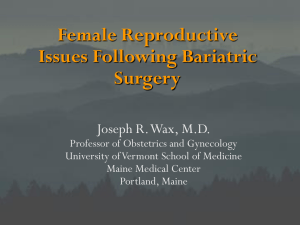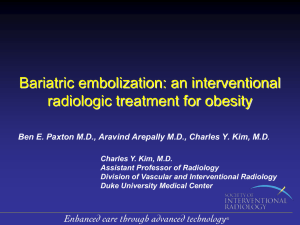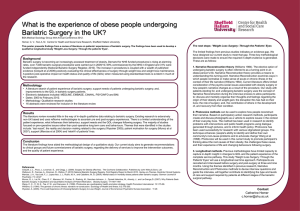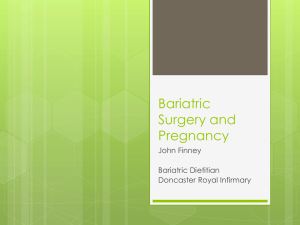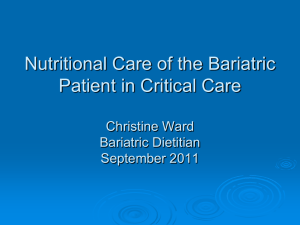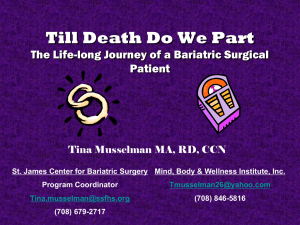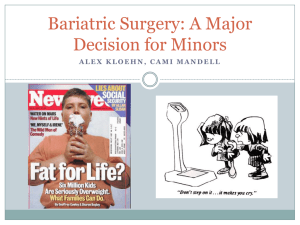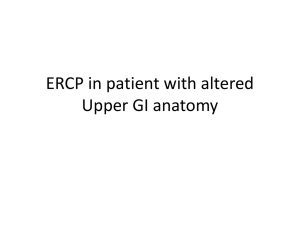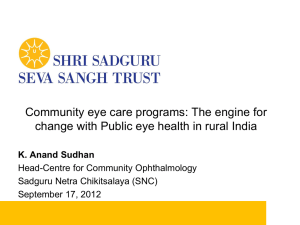Nutritional Risks After Surgery - obgynkw
advertisement
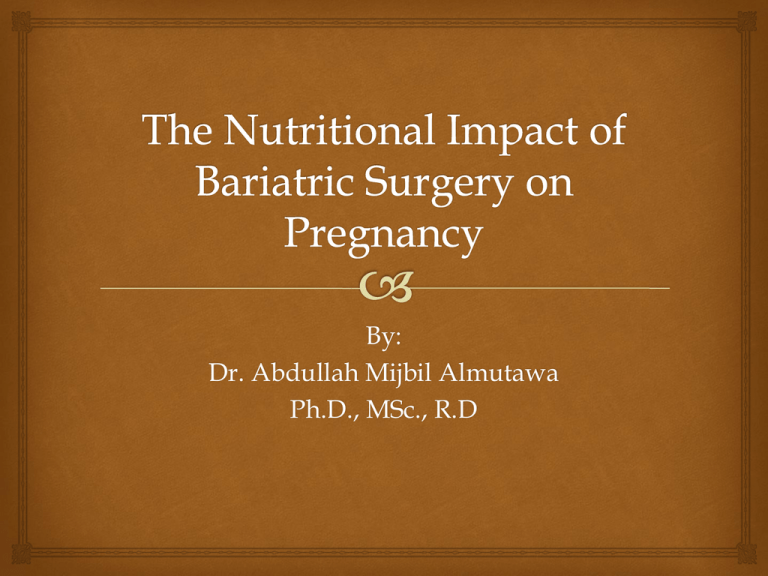
By: Dr. Abdullah Mijbil Almutawa Ph.D., MSc., R.D Topics Nutritional Risks after Surgery Timing your Pregnancy Weight Gain During Pregnancy Calorie Intake Protein Intake Micronutrient Deficiencies Special Considerations References Nutritional Risks After Surgery Bariatric surgery increases the risk for nutrient deficiencies. The severity of risk depends on the type of procedure a person has had. Here's how they rank from lowest to highest risk: Adjustable gastric banding (Restrictive bariatric procedure ) Vertical sleeve gastrectomy (Restrictive bariatric procedures Gastric bypass (Malabsorptive operation) Bilio-pancreatic diversion (Malabsorptive operation) Nutritional deficiencies are caused by decreased: Absorption of nutrients from food Secretion of stomach acid to aid in digestion and absorption Intake of nutrients as a result of food intolerances, chronic nausea, vomiting and/or diarrhea Timing Your Pregnancy It is recommended that women wait 12-18 months after surgery before trying to conceive. Why ? Rapid weight loss Risk of nutritional deficiencies right after surgery. Weight Gain During Pregnancy The amount of weight a woman needs to gain during pregnancy is based on her body mass index (BMI) before pregnancy, according to the Institute Of Medicine, 2009. Calorie Intake Calorie recommendations for the pregnant bariatric patient include approx. 300 kcal/day above maintenance guidelines for bariatric surgery. Most of the extra calories must come from protein. Protein Protein is the most important macronutrient for the bariatric pt. To ensure adequate intake, protein must be consumed at the beginning of the meal. Pregnancy (18 months after bariatric surgery): 1.1g/kg/day of protein Pregnancy (During the 18 months after surgery): 1.5g/kg/day of protein If needed, sugar-free protein shakes may be introduced. Bariatric Food Guide Pyramid Calcium Calcium deficiency caused by: Inadequate consumption Malabsorption Bypass procedures lead to Calcium deficiency as a result of excluding the duodenum and proximal jejunum from calcium absorption. It is recommended to increase the intake from 1000 mg of calcium citrate with 10 mcg vitamin D to 2000 mg of calcium citrate with vitamin D (50–150 mcg). Calcium Citrate does not require an acidic environment to be broken down. Foods high in Ca: Dairy products – sesame seeds – Broccoli – Salmon – Sardine – tofu – Soya Beans – Chia seeds - Nuts. Iron In general, pregnant women require more Iron. Iron in multi vitamin supplements(18mg)is not enough. Most of the iron from foods like meats, legumes, and iron-fortified grains is absorbed in the stomach and the first part of the small intestine. Patient must consult her doctor for Iron supplementation. Calcium, Coffee, tea, and cola sodas can interfere with iron absorption (decaffeinated or caffeinated). Unfortunately, there are no NUTRITIONAL recommendations for pregnant women after bariatric treatment YET. Vitamin B12 18% of Vitamin B12 deficiency is found in patients post GS surgery (Gehrer). Supplementation must be prescribed by doctor. Foods high in Vitamin B12: Liver Salmon Beef Egg Cheese Fortified cereals Folate Halverson, in his study found 38% of by pass surgery patients are deficient in Folate. Deficiency of Folate is less common in GS surgeries. Daily intake of 1mg of Folate has been found to help prevent deficiency. Foods high in Folate: Liver – Sunflower seeds – Leafy green vegetables – Peas – Beans – Asparagus. Zinc Zink should be considered especially after malabsorptive bariatric operations. Low levels of zinc have been combined to premature deliveries, low birth weight, abnormal fetal development, and spina bifida. Optimal dose of zinc required which is 15 mg a day. Foods high in Zink: Bran – Low fat roast beef – Veal liver – pumpkin seeds – dark chocolate – Lamb – Peanuts. Magnesium Studies show low magnesium levels in women who have had a premature labor. During pregnancy requirement for magnesium rises two times. supplementation is obligatory at the dose of 200– 1000 mg daily if states of deficiency occur or when symptoms of deficiency appear. Foods high in Mg: Bran Rice – Oats – Watermelon seeds – Flaxseeds – Brazil nuts – Almonds. Iodine Iodine requirement during pregnancy rises twice during the first trimester. WHO recommends its daily intake at the level of 250 mcg. Only 150 mcg should be supplemented while the rest absorbed during nutrition. Unfortunately, there are no recommendations for the pregnant women after bariatric treatment YET. Foods high in Iodide: Sea Vegetables like Kelp – Cranberries – Yogurt – Potatoes – Dairy. Special Considerations To maximize the absorption of Calcium and Iron supplementation, the two should NOT be taken at the same time. To avoid Constipation: Increase fiber intake 25-35g/day Moderate Exercise Drink Two liters of water between meals Sun exposure is a Must for adequate Vit D levels. (Vit D food fortification is never enough) Chewing food slowly has a great effect on micronutrient absorption. References Blankenship J. Pregnancy after surgical weight loss: Nutritional care and recommendations. Weight Management Newsletter. 2005;3(1): 6-8. Kushner R. Managing micronutrient deficiencies in the bariatric surgical patient. Obes Manage. 2005;1(5):203-206. Raymond RH. Hormonal status, fertility, and pregnancy before and after bariatric surgery. Crit Care Nurs Q. 2005;28(3):263-268 Buchwald H, Avidor Y, Braunwald E, et al. Bariatric surgery: A systemic review and metaanalysis. JAMA. 2004;292(14):1724-1737. Sheiner E, Levy A, Silverberg D, et al. Pregnancy after bariatric surgery is not associated with adverse perinatal outcomes. Am J Obstet Gynecol. 2004;190(5):1335-1340. C. B. Woodard, “Pregnancy following bariatric surgery,” Journal of Perinatal and Neonatal Nursing, vol. 18, no. 4, pp. 329–340, 2004. L. F. Martin, K. M. Finigan, and T. E. Nolan, “Pregnancy after adjustable gastric banding,” Obstetrics & Gynecology, vol. 95, no. 6, pp. 927–930, 2000. M. M. Kjaer and L. Nilas, “Pregnancy after bariatric surgery—a review of benefits and risks,” Acta Obstetricia et Gynecologica Scandinavica, 2012. References G. A. Decker, J. M. Swain, M. D. Crowell, and J. S. Scolapio, “Gastrointestinal and nutritional complications after bariatric surgery,” American Journal of Gastroenterology, vol. 102, no. 11, pp. 2571–2580, 2007. R. Kushner, “Managing the obese patient after bariatric surgery: a case report of severe malnutrition and review of the literature,” Journal of Parenteral and Enteral Nutrition, vol. 24, no. 2, pp. 126–132, 2000. 28.J. H. Beard, R. L. Bell, and A. J. Duffy, “Reproductive considerations and pregnancy after bariatric surgery: current evidence and recommendations,” Obesity Surgery, vol. 18, no. 8, pp. 1023–1027, 2008. 13.S. Gehrer, B. Kern, T. Peters, C. Christofiel-Courtin, and R. Peterli, “Fewer nutrient Deficiencies after laparoscopic sleeve gastrectomy (LSG) than after Laparoscopic Roux-Y-gastric bypass (LRYGB)-a prospective study,” Obesity Surgery, vol. 20, no. 4, pp. 447–453, 2010.

